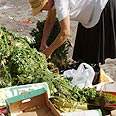
Poverty is on the rise: Latet Israeli Humanitarian Aid – has published its fifth annual alternative poverty report recently. The report, said the organizations, aims to present a wider picture of poverty in modern-day Israel, than the one published by the Central Bureau of Statistics.
Latet's 2007 poverty report is indicative of a process in which many are finding it harder and harder to provide their families with the most basic necessities: Employment, education, healthcare, housing and nutrition.
- The data indicates that 60% of those who indigent are completely dependent on voluntary assistance; and without it they would not be able to provide their families with more than two hot meals a week.
- Forty-six percent of indigent families depend on relief organizations to obtain half, or more, of the basic food basket.
- In 2007, the majority of relief organizations reported an increase in both the numbers of those applying for assistance and the amounts of food distributed. The increase averaged 24%.
- A majority of the public – 78% - define hunger as "the inability to obtain basic minimal nourishment" – the majority of the public does not necessarily associate "hunger" with the physical feeling, but rather with the inability of one to provide basic foods for themselves and their family.
- One-third of dependents (31%) have experienced hunger – a 16% drop from 2006 (36%).
- The majority of those in need – 57% - have only two meals a day, as opposed to the majority of the public (58%), who eat three meals or more a day .
Minimum wage over welfare
Latet's report also found a vast increase in poverty numbers over the past few years, due to the government's failure to formulate and implement a State funded relief program (34%); the lack of resources and employment opportunities, the existence of working conditions which make it impossible for some to make an honest living (37%) and wage erosion (30%).
According to the data, 43% of the families living under the poverty line are large families, 33% are single-parent households, 38% have been unemployed for a lengthy period of time, 18% are middle-class families and the majority of indigents are women who have not finished high school.
The average poor household, added the report, has 3.6 children, and has earnings of about NIS 2,864 (approx. $780). These families, the majority of which stated they would rather be employed than go on welfare – do not own their own homes and are struggling with mortgage or rent payments. Most have also had their power, water and gas cut off; and many are in need to dental care, which they cannot afford.
Latet's report further indicated that many of the families experienced feelings of despair and that the parents are concerned about their children's disadvantaged future. The majority of the children lack school supplies.
Private assistance in jeopardy
Latet has found that the majority of relief funds derive from private donations and from the business sector. The data, however, indicated a concerning decrease in the monetary donations made to relief organizations, which in turn find it harder to provide for those in need.
According to the report, 2007 saw a 12% decrease in donations to relief organizations. Some 49% of the associations said that unless a government relief program is put in place immediately, they would be forces to close their doors. About 72% of the organizations reported they were unable to meet the demand.
According to Latet, 2007 also saw a 6.5% rise in the number of volunteers; as 62% of the public acknowledges that these associations are the only ones trying to tackle the poverty problem, even though they are not supposed to.
Some 89% said the believed the government should head the fight against poverty, but only 13% think it actually does.
The public, noted the report, has become jaded and despite poverty figures spiking, it no longer perceives it as the most urgent problem on the public agenda, as it now ranks forth with 35%. Education is perceived as the most urgent problem (50%), followed by security issues (37%) and corruption (37%).















